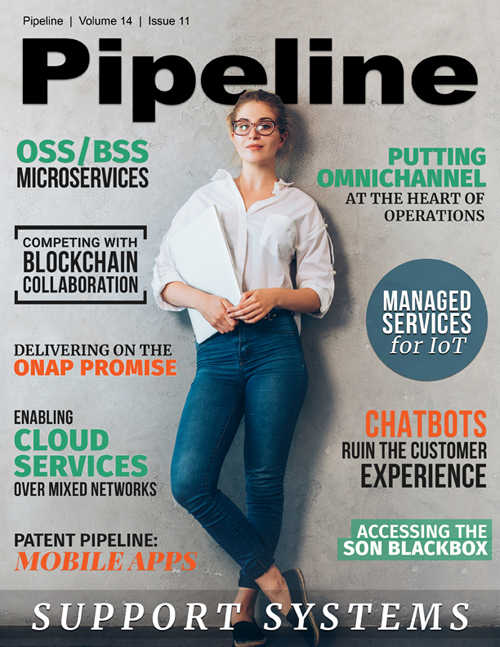Telecom Industry News
Also at DTW, Pipeline also got a sneak peek at new market entrant Ziotis, who is emerging from what they call "stealth mode." Ziotis is leveraging the combined power of AI and blockchain to foster collaboration across different organizations, networks, and domains. The company is promoting a "zero pane of glass" approach whereby AI and automation can action data without human intervention. AI was consistent theme and remains a hot topic, and an ongoing debate on what is being called "AI" ensued. The dividing line seems to be algorithms that sit atop data lakes, versus an actual intelligence that can learn and make independent decisions on its own.
The Sigma Systems team was out in full force at DTW, sporting fresh new kicks in what we feel was the best branding initiative at the event. If you saw a pair of trendy, orange Adidas afoot a
tech guru at the event, that was them. But aside from being best-in-show from a branding perspective, behind the scenes Sigma has undergone its own transformation. The company's
portfolio now encompasses all company products to form a consolidated offering it has dubbed "Next Done Now." Sigma was also recognized in Pipeline's annual Innovation Awards,
winning the Innovation in Business Support Systems category and being awarded runner-up in the Innovation in OSS category.
Pipeline's awards are voted on by an exclusive, external judging panel comprising technical executives from service provider and analyst companies—and this year featured judges from Singtel, Telenor, Windstream, and Analysys Mason.
Pipeline Innovation Awards
Just prior to DTW in Nice, France Pipeline announced the results of its annual Innovation Awards Program and held its annual Innovation Award reception. This year, the Innovation Awards program featured the latest technical innovations across categories such as Networking Technology, Big Data and Analytics, Cloud Technology, Managed Services, Security & Assurance, OSS, BSS and more. Winners of this year's program included: CENX, CSG, Netcracker, Radisys, Sigma Systems, and WeDo—with Netcracker sweeping three categories. For more on the results of this year's Innovation Awards program, which was announced just prior to DTW, check here.
Super Early Bird nominations are now open for the next Pipeline Innovation Awards, which allows companies to enter the competition at the most cost-effective rate. This year's program features new categories and even the ability to suggest new, custom categories. To enter the Innovation Awards competition, click here using promo code "PLSEB18". This special opportunity to enter the awards is only available for a limited time so, for those who know they want to compete, don't delay.
Mergers and Acquisitions
In an epic $146 billion merger, T-Mobile and Sprint combined forces, accelerating 5G innovation and increasing competition. T-Mobile US and Sprint Corporation announced entry into a definitive agreement in an all-stock transaction at a fixed exchange ratio of 0.10256 T-Mobile shares for each Sprint share or the equivalent of 9.75 Sprint shares for each T-Mobile US share. Based on closing share prices on April 27, this represents a total implied enterprise value of approximately $59 billion for Sprint and approximately $146 billion for the combined company.
To boost CX, Verizon has acquired Moment, a New York-based design and strategy firm founded in 2002. Verizon Communications employees can immediately join the company’s growing in-house design team and be responsible for creating end-to-end customer experiences including in-store, online, mobile and live customer service by phone or chat.
In Europe, Vodafone announced it will acquire Liberty Global’s operations in Germany, the Czech Republic, Hungary, and Romania. The enterprise value of the acquisition is 18.4 billion Euros.
5G Update
5G updates continued apace this month. In a joint proof of concept (PoC) called the Blade Runner project, multiple carriers—including Vodafone, Verizon, BT, AT&T, Orange, du, NTT, and TIM—participated in complex service assurance scenario testing. Designed to develop the underlying OSS infrastructure required for multiple carriers to work together to deliver end-to-end service orchestration, the project will ultimately help carriers serve large enterprise customers with multiple global locations and complex service assurance scenarios—leveraging industry standards such as ODA, ONAP, and open APIs.



















